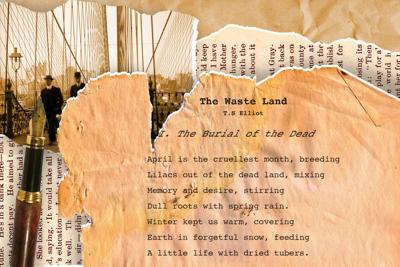Poetry can bring people together and allow feelings to be communicated in beautiful and unique ways. April is National Poetry Month and University of Georgia students and Athenians alike are taking part in celebrating it.
This April, poetry is being written furiously and with a purpose. One way people have been celebrating the month is through the Escapril challenge, a poetry prompt challenge created by author Savannah Brown. Each day of April contains a prompt to write a poem about with examples such as “garden,” “vanity,” “trying to be good,” “intimacy,” “crush” and “we’re not alone.”
UGA sophomore Ashley Veazey, who is currently studying abroad in Germany, has been participating in the Escapril challenge. For Veazey, poetry is “a simple way to express complex feelings.”
Imani Andwele, a junior horticulture major, has been interested in writing their entire life, but poetry became a passion for them in high school “when the emotion started.” This year is their second time participating in Escapril.
“Poetry is such a vulnerable form of art. When people write poems, it’s really showing themselves as who they are,” Andwele said.
Jeff Fallis, Athens’ first official poet laureate, knows and cares a lot about poetry. The title of poet laureate was given to him by the Athens Cultural Affairs Commission last year.
“[As poet laureate, I’m] just trying to be a public face for poetry,” Fallis said. “[I] try to think of creative and interesting ways to bring poetry to as many people as possible as I can in Athens.”
Fallis believes poetry is the best way for him to explain his experiences. He also likes how poetry reminds him of how “strange and weird and musical and kind of unlikely language is and how it can do so many wonderful things.”
Poetry can be a polarizing subject that some people either love or can’t stand. Fallis believes the polarization comes from the way poetry “disrupts” the way people think of language.
“My sense is that every kid’s a poet up to a certain age and then it often gets educated out of them,” Fallis said.
Fallis said language is often taught as being pragmatic and conveying meaning while poetry is not always so straightforward.
“Poetry doesn’t hold your hand and tell you what it’s supposed to mean and one of the things I love about poetry that might be difficult for other people is that it might mean two, three, four, five, six or 1000 things at once,” Fallis said.
Veazey likens poetry to music. “It’s like someone telling you to listen to a certain kind of music. You have to find for yourself what you enjoy and what you like to read,” they said.
Andwele thinks poetry can be seen as pretentious.
“[It could be seen as] very avant garde and melodramatic but there’s nothing wrong with that as an avant garde, melodramatic person,” Andwele said.
In the spirit of National Poetry Month, Fallis has done readings at libraries, shown his and other poets’ work around town, and plans to do a creative writing exercise with the students at Clarke Middle School. As for Veazey and Andwele, they will continue with Escapril.


